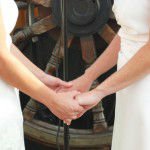Hollingsworth v. Perry: Sam-Sex Marriage Now Legal in California

After years of legal battles, same-sex couples in California are now free to walk down the aisle, albeit on a technicality. In Hollingsworth v. Perry, the U.S. Supreme Court held that supporters of Proposition 8, the state’s voter approved ban on same-sex marriage, did not have standing to appeal a lower court order invalidating the ban.
The Facts of the Case
In 2008, the California Supreme Court held that limiting the official designation of marriage to opposite-sex couples violated the equal protection clause of the California Constitution. In response, California voters passed a ballot initiative, known as Proposition 8, that amended the California Constitution to provide that “[o]nly marriage between a man and a woman is valid or recognized in California.”
Same-sex couples filed suit in federal court, arguing that Proposition 8 violated the Due Process and Equal Protection Clauses of the Fourteenth Amendment to the U.S. Constitution. The defendants named in the suit included California’s Governor and other state and local officials responsible for enforcing California’s marriage laws.
When the officials refused to defend the law, the District Court allowed the initiative’s official proponents to intervene and defend it. After a bench trial, the court declared Proposition 8 unconstitutional and enjoined the public officials named as defendants from enforcing the law. While the officials elected not to appeal, the petitioners did. After the same-sex couples raised the issue of standing, the Ninth Circuit Court of Appeals concluded that petitioners had standing under federal law to defend Proposition 8’s constitutionality even through the public officials refused to do so.
The Supreme Court’s Decision
While the same-sex couples asked the Supreme Court to address the larger issue of the legality of Proposition 8, the majority resolved the case on the issue of standing. By a vote of 5-4, the Court ruled that the proponents of Proposition 8 were not authorized to challenge the court order invalidating the ban.
“The requirement of a ‘case’ or ‘controversy’ is an essential limit on our power: It ensures that we act as judges, and do not engage in policymaking properly left to elected representatives,” Chief Justice John Roberts wrote on behalf of the majority.
As Justice Roberts further explained in the majority opinion, “Once Proposition 8 was approved, it became a duly enacted constitutional amendment. Petitioners have no role — special or otherwise — in its enforcement. They therefore have no “personal stake” in defending its enforcement that is distinguishable from the general interest of every California citizen. No matter how deeply committed petitioners may be to upholding Proposition 8, that is not a particularized interest sufficient to create a case or controversy under Article III.”
In light of the Supreme Court’s decision, the Ninth Circuit lifted its order blocking same-sex marriages in California. Thus, California is now the 13th state in the country to legally recognize such unions.
Previous Articles
SCOTUS Rules State Can’t Immunize Parties from Federal Civil Liability
by DONALD SCARINCI on January 29, 2026
In John Doe v. Dynamic Physical Therapy, LLC, 607 U.S. ____ (2025) the U.S. Supreme Court held that...
Supreme Court to Address Racial Discrimination in Jury Selection
by DONALD SCARINCI onWhile the U.S. Supreme Court has concluded oral arguments for the year, it continues to add cases t...
Supreme Court Halts Deployment of National Guard to Chicago
by DONALD SCARINCI on
In Trump v. Illinois, 607 U.S. ____ (2025), the U.S. Supreme Court refused to stay a district court...
The Amendments
-
Amendment1
- Establishment ClauseFree Exercise Clause
- Freedom of Speech
- Freedoms of Press
- Freedom of Assembly, and Petitition
-
Amendment2
- The Right to Bear Arms
-
Amendment4
- Unreasonable Searches and Seizures
-
Amendment5
- Due Process
- Eminent Domain
- Rights of Criminal Defendants
Preamble to the Bill of Rights
Congress of the United States begun and held at the City of New-York, on Wednesday the fourth of March, one thousand seven hundred and eighty nine.
THE Conventions of a number of the States, having at the time of their adopting the Constitution, expressed a desire, in order to prevent misconstruction or abuse of its powers, that further declaratory and restrictive clauses should be added: And as extending the ground of public confidence in the Government, will best ensure the beneficent ends of its institution.





